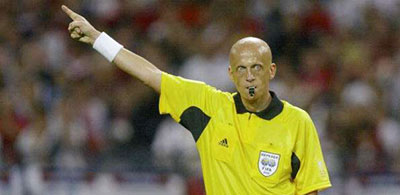Referee bias in football: is it there, and how should the referee influence the bets?
Factors affecting the outcome of a football match
The result of a football match depends on a number of factors. Among them is the identity of the referee. In particular, his interpretation of the key events of the match can play a decisive role in the fate of individual confrontations.
As is the case with footballers, the ability and experience of the referees varies, and they also tend to make mistakes, although they are extremely rare.

Thus, it is inevitable that fans or coaches feel that their team is being judged unfairly, and sometimes there are complaints that a particular referee is constantly showing bias against a particular team.
If this were indeed the case, it would entail obvious shifts in the odds for matches with these teams when a specific referee is appointed. But do we have any statistics that support these widely held beliefs?
The English Premier League has about twenty referees for 380 games of the season, but most of these matches are played by about half of this number of referees. During the 2013/2014 season, twelve referees served twenty or more matches. It is therefore inevitable that the team will meet with the same referee on a regular basis. It is not uncommon for many referees to judge a team’s matches more than 20 times throughout their career. For example, Mike Dean started his career in the Premier League in 2000/2001 and successfully played 350 first-class matches.
Breaking the myth of bias in referees
In order to make sure that the referees do not show any bias or preference towards the individual teams, we took the sequence of matches when the team did not perform well when serving the games by the specific referee and compared them with the subsequent games where he was judging again. That is, we studied the possibility that the “black lane” with this referee will continue, outside the general statistics.
For this purpose, we took the sequences of 10 matches, in which the team played worse than expected, if you look at the bookmaker’s coefficients, when working with a single referee. We did it for the 50 blackest stripes of four English top clubs – Liverpool, Chelsea, Arsenal and Manchester United – between 2000 and 2013. After that, we studied the result of the match following each series of 10 bad games for the team, while refereeing the same referee.
Expectations, based on the odds for these matches, were such that the teams had to win a total of 25 out of 50 games and 12 times draw, with a success rate of 0.62. In fact, the teams won 26 times and drew 11 times in these 50 matches, which almost coincided with expectations.
In short, the bad results are within the statistics and are fully reflected in the pre-match expectations. Almost certainly, the sequence of bad performances is just a random set of results, not the influence of the referee’s personality, contrary to general opinion.
Sometimes referees can make mistakes. However, the Premier League referees are not biased, and it would be foolish for a football betting player to bet on the outcome of a match based on the referee’s personality.
Referee versus Arsenal.
Dean was appointed to more than 30 English Premier League matches with Arsenal, and the specific period from 2009 to 2013 has led fans to believe that Dean is an extremely “ugly” judge for the canoniers.
One victory and five draws and a success rate of 0.23 over 15 matches are quite eloquent indicators, even taking into account the high status of many matches, where Arsenal played against their opponents in the fight for the title. Editor’s note: for the calculation of the success rate, 1 draw equals 0.5 wins. That is, 1 victory and 5 draws is 3.5 (three and a half) victories, which is 23% of 15 matches.
The estimated probability of the outcome of the match, which can be calculated on the basis of pre-match coefficients, predicted an average of 6 Arsenal victories and 4 draws in these 15 matches. That is, the expected success rate was more than 0.5 per game, while in reality it was much lower – 0.23.
If you imitate the results of these 15 games thousands of times, the success rate of 0.23 or lower will be extremely rare – about every 250th attempt.

